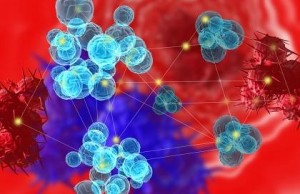

 “Worldwide, colorectal cancer is responsible for around 694 000 deaths each year, according to the World Health Organization. Decision making on treatment in the clinic currently depends largely on factors such as how much the tumour has grown and the age of a patient. As each patient is unique, the success of such treatments is largely unpredictable. To replace the ‘one size fits all’ approach, the APO-DECIDE project, led by Professor Jochen Prehn at the Royal College of Surgeons in Ireland, is developing new clinical decision-making tools to help doctors categorise patients on the basis of their individual biological and genetic characteristics. “There are numerous genes and pathways altered in human cancers, and no single patient is like another,” says Prof. Prehn. “We now need to employ computational approaches to understand the complexity of genes and protein altered in individual cancer patients.” Such computational approaches (also termed systems biology approaches) use mathematics to explore how proteins interact with each other, and how these interactions produce a biological, clinically relevant effect.
“Worldwide, colorectal cancer is responsible for around 694 000 deaths each year, according to the World Health Organization. Decision making on treatment in the clinic currently depends largely on factors such as how much the tumour has grown and the age of a patient. As each patient is unique, the success of such treatments is largely unpredictable. To replace the ‘one size fits all’ approach, the APO-DECIDE project, led by Professor Jochen Prehn at the Royal College of Surgeons in Ireland, is developing new clinical decision-making tools to help doctors categorise patients on the basis of their individual biological and genetic characteristics. “There are numerous genes and pathways altered in human cancers, and no single patient is like another,” says Prof. Prehn. “We now need to employ computational approaches to understand the complexity of genes and protein altered in individual cancer patients.” Such computational approaches (also termed systems biology approaches) use mathematics to explore how proteins interact with each other, and how these interactions produce a biological, clinically relevant effect.
The crux of cancer treatment lies with apoptosis, or programmed cell death. Current chemotherapy treatments increase apoptosis in the tumour or nudge the cells along the path to self-destruction. Using the APO-DECIDE system, an oncologist will be able work out the dose of apoptosis promoter required on an individual basis, meaning the patient receives a dose best suited to treat their tumour right from the start.
“The tools developed in APO-DECIDE will deliver the right chemotherapy to the right patient at the right time, hence avoiding unnecessary side-effects and accelerating access to better treatments,” says Prof. Prehn.
Published in the Horizon 2020 report published 15th of May 2015:
https://ec.europa.eu/programmes/horizon2020/en/news/threshold-personalised-cancer-treatment
Understanding the patient – and the tumour
Tumours can become unresponsive to chemotherapy. They are made of different types of cells and many develop resistance to chemotherapy drugs. For example, for one particular type of colorectal cancer, up to 50-60 % of patients prove unresponsive to a commonly used treatment regime.
To get the treatment right, APO-DECIDE, which ends in November 2014, is not only considering differences between patients – it is also analysing the cancer at a molecular level. This information will then be used to identify weak spots in the tumour that can then be targeted with new drugs (‘apoptosis sensitisers’) that reprogramme tumour cells to respond to treatment.
This strategy avoids a situation in which a patient who is not responsive to the drugs has to endure harsh chemotherapy treatment needlessly. Analysing the chemical pathways (strings of biochemical reactions) in a tumour prior to therapy and knowing that the tumour will be responsive also reduces uncertainty, and means that scarce resources can be used to maximum benefit.
Extending the technology to other cancers
Prof. Prehn says researchers now widely accept that the chemical roots of a tumour resistance to treatment are shared by most cancer cell types. As common pathways are responsible for a tumour not responding to chemotherapy drugs, the results of APO-DECIDE may be helpful in the battle against many other types of cancer.
And the results will help to do more than personalise treatment. As well as using knowledge about the biochemical pathway to re-sensitise cancer cells, APO-DECIDE is also making the reverse possible. A new process can de-sensitise normal cells vulnerable to damage during chemotherapy, such as bone marrow stem cells.
Trials are underway, involving 600 patients. If they go as expected, doctors could be using the APO-DECIDE technology in clinics in two to three years’ time.
APO-DECIDE’s research stands to provide real benefits for cancer patients. Prof. Prehn summarises the impact on clinical practice: “Such a systems-wide model approach can deliver a new generation of patient analysis tools that inform oncologists and health care providers about the type and dosage of chemotherapy that is best suited for individual patients.”
Using Systems Medicine to Deliver Personalised Medicine for Colorectal Cancer
Apoptosis Modelling for Treatment Decisions in Colorectal Cancer is a short, focused, 2-year research programme and a partnership with 3 academic institutions (Queen’s University Belfast; Descartes University Paris; University Clinics Frankfurt) and 3 SMEs including two Irish SMEs (Oncomark & Pintail) aimed at exploring and validating the clinical utility of a computational model of effector caspase activation (PCCP) in the context of colorectal cancer, employing automated digital pathology technologies, RPPA analysis, as well as PK/PD modelling.
The APO-DECIDE consortium will tackle the problem of chemotherapy resistance in colorectal cancer. By analyzing protein levels and DNA mutations in individual tumours, and by incorporating these biological data into a complex modeling environment that recapitulates how these entities interact, APO-DECIDE will develop novel diagnostic tools that predict which patients will likely benefit from chemotherapy. It is a hope that these clinical decision-making tools will enable doctors to develop personalized therapies for patients to ensure the best outcomes while potentially avoiding unnecessary chemotherapy and side effects. These new prediction tools may also be used in clinical trials to develop new drugs to treat bowel cancer, enabling ‘smart’ clinical trials design in the future. Commercialization of the project results will be facilitated by OncoMark Ltd. and Optimata Ltd.
Please see the homepage of APO-DECIDE for more details.
Project press release at Horizon 2020: http://ec.europa.eu/programmes/horizon2020/en/news/threshold-personalised-cancer-treatment
This project has received funding from the European Union’s Seventh Framework Programme for research, technological development and demonstration under grant agreement no 306021.